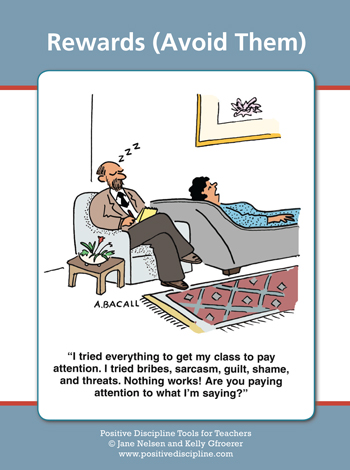by Dr. Jane Nelsen and Dr. Kelly Gfroerer
While rewards may be a quick way to motivate students, it is important to stop and think, “What are students learning when they receive rewards?” Research has shown that rewards are not effective long-term and in fact can be harmful to students. The rewards become more important than the inner satisfaction of learning and contribution.
Below is an excerpt from, Positive Discipline Tools for Teachers. Click Here to Order.
Tool in Action
Dexter, my four-year-old son, started a new year of preschool. Dexter’s pre-K teachers wanted to motivate their students to follow directions, participate in class, and engage in pro-social behaviors. So they decided to implement a sticker chart in the classroom. When a student received five stickers he or she could take a prize from the prize box.
The first day of class was difficult for Dexter, but he got a sticker because it was the first day. The second day he did not get a sticker. The next two days he earned his stickers, but for the two days after that he continued to have difficulties. Every morning on the drive to school I spoke to him about what he needed to do to have a successful day. I followed it up with “I believe you will make good choices today.”
On the last day that he didn’t receive a sticker, I asked him, “Is it important to you that you receive a sticker from your teachers?” He paused for a few seconds, then looked me in the eyes and said, “Well, it’s important to the teachers.”
This insight reinforced the idea that external motivators do not work for our children. The sticker chart became so distressing for the other students that some of them who loved school started to tell their parents they didn’t want to go to school. Luckily the teachers realized the stress this chart was having on the children and discontinued it.
In the same class there was another four-year-old girl who received all five of her stickers in the first week, but the second week she was having difficulty following directions and was no longer motivated to earn her stickers. When her parents asked her about it she simply stated, “I don’t need to earn any more stickers, I already got my prize.” Once again, another failed attempt to externally motivate a four-year-old. — Jeffrey Saylor, San Diego, CA
Alfie Kohn also makes a strong argument against using rewards to motivate children. Kohn shares how rewards (stickers, candy, praise) decrease students’ internal motivation to repeat tasks that they are being rewarded for doing. Teachers report that rewards get students to work quickly and quietly, yet they fail to understand the long-term negative effect. Kohn argues there is a risk to rewards, because rewards don’t help students develop internal motivation, self-reliance, or responsibility.
Tool Tips
- Rewards teach external motivation. Positive Discipline tools teach internal motivation.
- Help students enjoy the inner reward of feeling capable and making a contribution. Examples:
- Instead of rewards, ask students to put challenges on the class meeting agenda so the whole class can be involved in finding solutions.
- Ask for help. “I need your help right now. What are your ideas for respectful solutions?”
- Just like praise, most students love rewards, just as they love candy. A little won’t hurt, but too much does not help students develop intrinsic motivation.


No Comments yet!